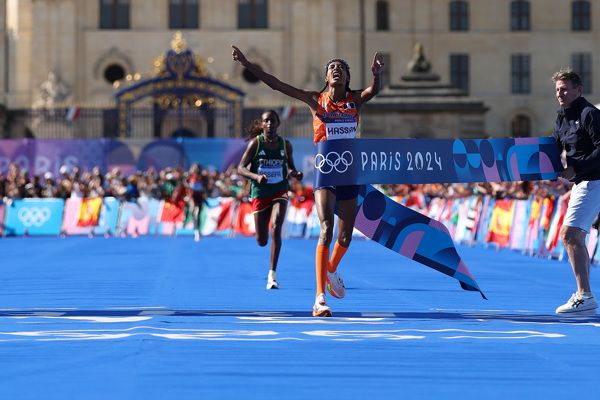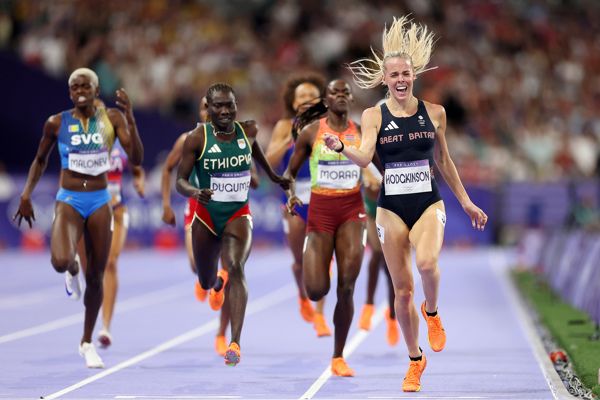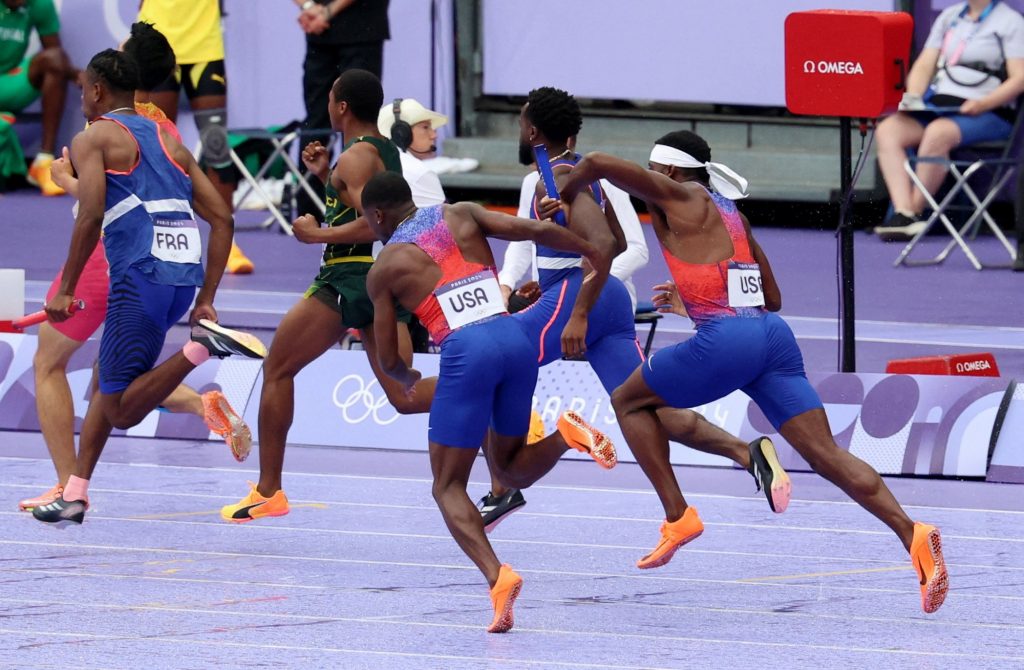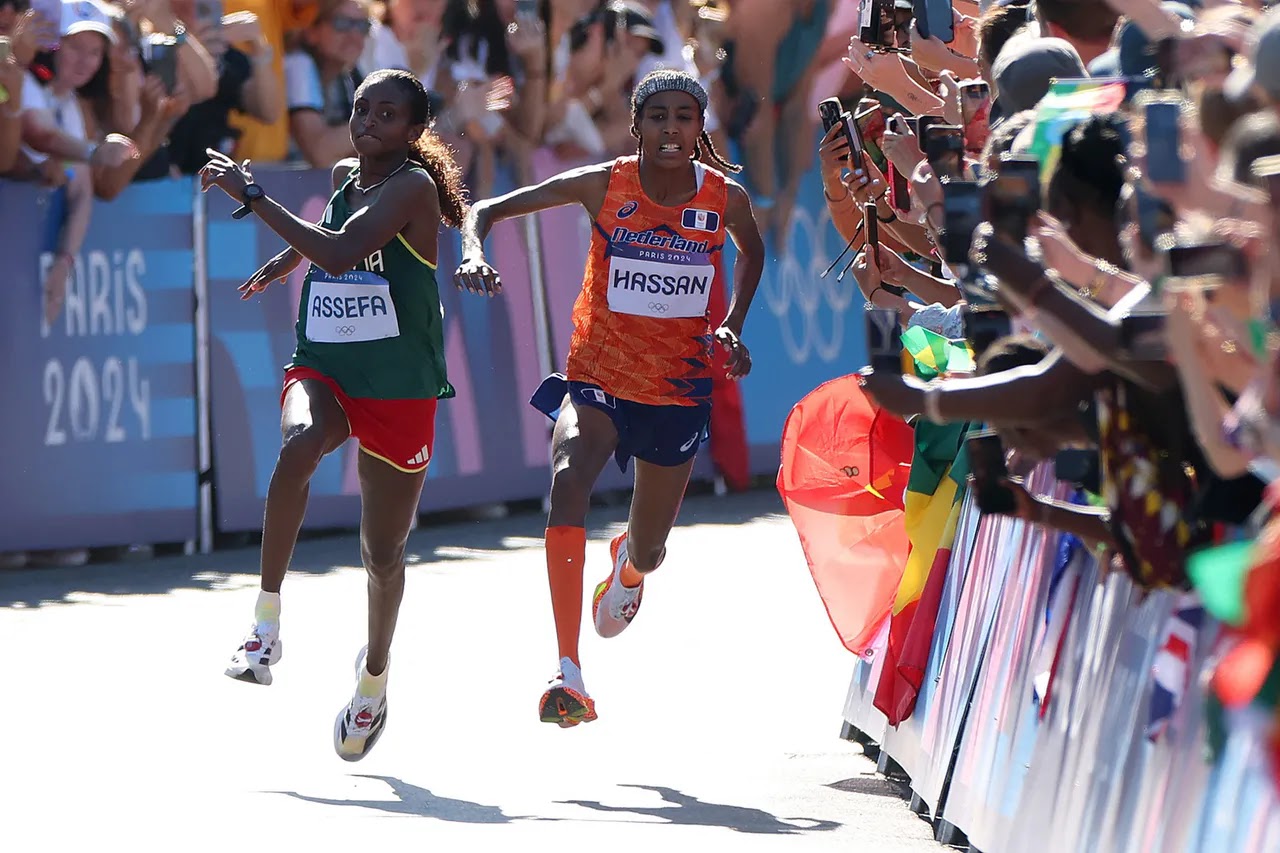Coming into the Olympics the hype surrounding N. Lyles was barely tolerable. Every media outlet was talking about the four gold medals that Lyles was going to win in Paris. The magic number of four was pervading everything to the point that Getty Images had mislabeled a photo from last year's World's where Lyles is showing three fingers after anchoring the US relay as "Holding Up 4 Fingers". These kind of predictions are reminding me the Mark Spitz Mexico disaster. Spitz went to Mexico predicting that he would win six gold medals. It turned out that he won just two (with the US relay team) plus one silver and one bronze. (He took his revenge four years later, but it is clear that Mexico must have stung).
And, in the case of Lyles, to add to the hype, there was the Netflix mini-series "Sprint" which premiered just before the Olympics. It's a series on the sprint stars Lyles, Richardson, Jackson, Hughes, Jacobs, Fraser-Pryce and Thompson. Jackson and Thompson did not make it to the Olympics, Jacobs had not completely recovered from his injury and finished 5th in the 100 m final, Hughes was eliminated in the semis and Fraser-Pryce withdrew from the 100 m semis (officially, due to an injury). This left Richardson and Lyles. The former lost to J. Alfred in the 100 m but managed to secure silver and anchored the US relay to gold. For Lyles, things were not so simple. But we will come to that shortly.One more factor in the hype around Lyles was his feud with the NBA ecosystem. It started when Lyles at a post-World Championships conference took a swipe at the NBA for calling the season winners World Champions. I'll agree with Lyles on this point. They are merely US champions although, if there were World Championships for clubs, something akin to the Euroleague, the NBA stars would probably have won the title. Be that as it may, Lyles's remarks sparked strong reactions, with NFL players joining the conflict. J. Hart of the N.Y. Nicks did not hesitate to say "Damn, I really wanted to see him lose at all costs" (only to backtrack later and add "Respect. I can’t even hate him anymore"). T. Hill of the Miami Dolphins went as far as to question the legitimacy of Lyles' Covid illness as an excuse for his defeat in the 200 m.
And during the time the media were focusing on Lyles, nobody was taking seriously S. Hassan's "Zatopek" gambit. For those who need a refresher: in the 1952, Helsinki, Olympics, Zatopek (already olympic champion over 10000 m in 1948) won the 5000 and 10000 m with A. Mimoun taking silver in both distances. (Mimoun would take his revenge four years later winning the Melbourne Marathon, with Zatopek finishing 6th). Then Zatopek, who had never run a marathon before, participated in the race and won a third gold medal. His feat has never been matched. L. Viren attempted the same gamble in 1976 (he had already won the 5000-10000 m double in 1972). After his victories over the track events (the first double-double in history) he entered the Marathon. However, he could not do better than 5th. Times have changed since Zatopek's era, so aligning three gold medals appears now totally unrealistic. But Hassan is a Zatopek-class athlete and managed to make good on her bet winning two bronze in the track events and gold in the Marathon. After her victory in the marathon, the media woke up and started talking about her. Better late than never.
After this looong introduction let us now look at the results.
Women's 100 m semi-finals saw the elimination of several potential finalists: E. Swoboda, D. Asher-Smith, G. Bass, P. van der Weken, G. Lückenkemper, A. Leduc, while S.-A. Fraser-Pryce did not show up. Concerning the latter a stupid rumour circulated initially, that she was denied access having arrived at the stadium with a non-official means of transportation. However it was shortly announced that she had dropped out of the semis due to an injury. J. Alfred had easily beaten S. Richardson in the semis and she did exactly the same in the final winning in 10.72 s, Richardson taking silver in 10.87 and M. Jefferson bronze with 10.92 s. D. Neita was 4th just ahead of T. Terry while Kambundji was back to good shape just in time, making the final where she had to content herself with a 6th place. I was expecting something better from T. Clayton (who ran a 10.89 s in the semis). Once more M.-J. Talou was unlucky, injuring herself in the final (where her 10.87 s in the heats, would have sufficed for a medal).
Running under 10 s in the men's 100m semis was not enough in order to qualify for the final. L. Hinchliffe (9.97), B. Richardson (9.95), A-H Sani Brown (9.96), A. De Grasse (9.98) did not make it. K. Thompson was most impressive in the semis and the natural favourite for the gold medal. And he was leading the final till 90 m. But under the stress of the race he ran very tense and Lyles, more experienced at high level, ran more relaxed and managed to prevail by 5 milliseconds. 9.784 to 9.789 s. I was expecting A. Simbine to win bronze but in the end that went to F. Kerley with Simbine 4th 9.81 to 9.82 s. That was probably the overall fastest men's 100 m.
In the men's 200 m P. Tortu took his revenge over T. Mumenthaler who had beaten him for the European title and advanced to the semis only to be eliminated there, along with the 2020 gold medalist A. De Grasse and 400 m Rio winner W. van Niekerk. In the final Lyles arrived on the track in his usual exuberant style (and got a yellow card for improper conduct) but it is true that we had seen him wearing a mask in the warm-up area. K. Bednarek led the race up to 120 m whereupon L. Tebogo took command and did not relinquish it till the finish line. The final times: Tebogo 19.46 s, Bednarek 19.62 s, Lyles 19.70 s and E. Knighton (perhaps not quite psychologically recovered from his alleged doping adventure) in fourth with 19.99 s. Lyles' four-gold bid was over then and there.
I was expecting a Thomas-Alfred duel in the women's 200 m. But this was not going to happen. Alfred led the race up to roughly 50 m but then G. Thomas took command and won easily with 21.83 s, Alfred winning silver with 22.08 s (but 21.86 s in the semis). D. Asher-Smith and D. Neita ran an excellent race, 22.22 and 22.23 s respectively, but barely missed the podium, the bronze medal going to B. Brown with 22.20 s. F. Ofili was 5th with 22.24 s and she is an athlete I am going to keep an eye on in the future.
In the men's 400 m A. Doom was injured in the semis where K. James registered the best time with 43.78 s. The favourite for the title was M. Hudson-Smith but he could not resist to the final sprint of Q. Hall finishing second 43.44 to 43.40 s. Similarly J. Richards lost the bronze medal to M. Samukonga 43.78 to 43.74 s over the last 50 m. This time, and despite an excellent time of 43.87 s, K. James was not on the podium. M. Norman finished last, having registered his best time in the heats, and it is my opinion that he must think seriously about the future of his career.
S. Miller-Uibo was present and ran in 53.50 in the repêchage but of course that was totally insufficient for the semis. It's a year and a half since she gave birth to her son. She had run in 52.65 last year in the World Championships (improving it later to 51.83 s). But this year's best is just 53.02 s. I don't know what is happening: at just 30 years of age she should still be competitive. M. Paulino was the logical favourite but with S. Eid-Nasser back from her two-year ban (for a whereabout violation) one could not be sure. The semis saw the elimination of L. Klaver, M. Nielsen, and L. Manuel (she would win the world U20 title a month later). In the final Paulino led all the way and could resist Nasser's final sprint, winning with 48.17 s (eclipsing Perec's olympic record) to Nasser's 48.53 s. N. Kaczmarek duel with R. Adeleke for bronze had the former prevailing, just as in the European's, 48.98 to 49.28 s. A. Anning was the fastest finisher and although she could do no better than 5th she was rewarded by a UK record, with 49.29 s.
In the men's 800 m final E. Wanyonii took command of the race at the bell and never relinquished it, winning with 1:41.19. G. Tual was in contention for a medal but faded over the final sprint finishing 6th. M. Arop and D. Sedjati had a great finish obtain silver and bronze respectively, 1:41.20, and 1:41.50. B. Hoppel, finishing 4th with 1:41.67, was rewarded with a US record erasing the one of the short-lived and over-hyped D. Brazier.
2024 was the year of K. Hodgkinson. And the absence of A. Mu made things even easier. All she had to do was out-sprint Moraa. And she did. The semis saw the elimination of several runners who one would expect to find in the final like J. Reekie, N. Yarigo N. Goule or Ph. Gill. K. Hodgkinson, strong with a 1:54.61 recent personal best, took control of the race at the bell, relinquishing it briefly to T. Duguma, but then out-sprinting everybody in the final stretch finishing in 1:56.72. Duguma managed to beat Moraa fo silver, 1:57.15 to 1:57.42. R. Lamotte fought all the way for a medal but in the end she finished fifth behind S. Maloney 1:58.18 to 1:57.66. I was slightly disappointed by the last place of P. Segkodiso: her personal best of 1:57.26 would have placed her in the medals.
J. Ingebrigtsen lost once more the 1500 m. I have trouble understanding his tactic in Paris. He came to Paris with a 3:26.73 personal best which made him a favourite. Instead he ran as if he was afraid of J. Kerr (probably he was). He gave a very fast pace to the race hoping to blunt Kerr's sprint, which he did, but in the same he exhausted himself and when it came to the final sprint he could not follow neither Kerr nor the surprise winner C. Hocker. Over the last metres Y. Nuguse passed a disappointed Ingebrigtsen who finished without a medal. The times of the winners were 3:27.65, 3:27.79 and 3:27.80 among the all-time best in the distance.
The only noticeable absence from the women's 1500 m was that of European 2024 champion C. Mageean who injured herself a few days before the Olympics. But in the final there were eyes only for F. Kipyegon (and, to be fair, also for J. Hull, who is having a great season). D. Welteji led part of the way but then Kipyegon took control and only Hull could follow her. Kipyegon won in an olympic record of 3:51.29, Hull finishing second in 3:52.56. And, in a great finish, G. Bell passed Welteji for bronze, with 3:52.61 improving Muir's british record (Muir also improved on the ancient record finishing 5th in 5:53.37). With her third olympic victory in a row, Kipyegon joined Thiam and Wlodarczyk. She can now vie for Al Oerter's (and King Carl's) four-in-a-row record.
In men's 5000 m Ingebrigtsen went back to the Ingebrigtsen we know. The race was on a tame tempo but at the bell H. Gebrhiwet had 4-5 metres lead over Ingebrigtsen. However on the opposite stretch Ingebrigtsen caught and passed him, R. Kwemoi following him. And over the final stretch G. Fisher coming from behind managed to snatch bronze. (He had done the same a few days before in the 10000 m). The winners time was an uninteresting 13:13.66 but in this case Ingebrigtsen was running for the medal. In fourth place, south-Sudanese D. Lobalu represented the Refugee Olympic Team. Two months before, in the Europeans, he represented Switzerland, winning gold in 10000 m and bronze in the 5000 m. (If you are interested in the personal adventure of Lobalu trying to have access to international competition I urge to read the Wikipedia article on him).
B. Chebet dominated the women's long distance, 5000 and 10000 m races. I still remember the fantastic sprint of Kipyegon, Hassan and Chebet in the 5000 of the 2023 World's where they finished in that order. There was another great sprint in Paris, only this time Chebet outrun the other two. N. Battocletti showed that she is one of the stars of women's long distance running, finishing fourth. The times of the winners: 14:28.56 for Chebet, 14:29.62 for Kipyegon, 14:30.61 for Hassan and an italian record of 14:31.64 for Battocletti. World record holder G. Tsegay was 9th, a pale image of herself (she would finish 12th in the 1500 m and 6th in the 10000 m). There was a ridiculous protest of the Ethiopian team arguing that Kipyegon had jostled Tsegay but fortunately good sense prevailed and Kipyegon kept her silver medal. In the 10000 m the tempo was rather tame. At the beginning of the final stretch Chebet was leading with M. Kipkemboi just behind her. But the latter could not resist to the finish of Battocletti and Hassan who shared the remaining medals.
During the whole men's 10000 m race I was observing J. Cheptegei. He was running in the middle of the pack while the ethiopian trio Barega, Kejelcha and Aregawi were leading most of the time. They tried to do the same thing as in Tokyo, where Barega managed to beat Cheptegei launching a very early finish and hanging on. But it's not by chance that Cheptegei is the best 10000 m runner. He knew exactly what he had to do and with 600 m to go he took the lead and was never threatened. He finished in 26:43.14, a new olympic record. In fact the first 13 finishers did improve Bekele's record (J. Gressier establishing a french record of 26:58.67 at 13th). B. Aregawi grasped silver beating G. Fisher thanks to a devastating finish. (I was somewhat disappointed by the second ugandan, J. Kiplimo, who could do no better than 8th).
G. Holloway dominated the 110 m hurdles final in his usual fluid way, winning with 12.99 s. The 2020 champion, H. Parchment made it to the final, but just qualified on time, and finished 8th. The women's 100 m hurdles was a much more open event. World record holder T. Amusan, olympic champion J. Camacho-Quinn, world leader M. Russell, world 60 m hurdles record holder D. Charlton, European champion C. Samba-Mayela all were present. It was clear that not all of them would make it to the final. And in fact, T. Amusan was eliminated in the semis along with D. Kambundji and C. Sember who fell and could not complete her semi. In the final M. Russell prevailed with 12.33 s but Samba-Mayela, who had qualified last with a time just better than the one of Amusan, finished ahead of Camacho-Quinn, 12.34 to 12.36 s (winning the only french medal in athletics). N. Visser, who is having a great year, was fourth (improving by one place her result from Tokyo).
The men's 400 m hurdles was again a race that I greatly enjoyed. All five "musketeers" (see my old article if you do not understand the moniker) were present: Warholm, Benjamin, McMaster, dos Santos and Samba. I was somewhat worried about Samba who has been tortured by repeated injuries over the last years. But all of them were present and they made the final, their order perturbed by a new troublemaker, french hurdler, C. Ducos who finished 4th with 47.76 s. This time C. Warholm could prevail over Benjamin finishing second 47.06 to 46.46 s, but ahead of dos Santos, 47.26 s. McMaster was 5th with 47.79 and Samba 6th 47.98 s. Young talent R. Clarke hit the 10th hurdle, fell and could not finish the race. (Last year in the World's Clarke had also a similar misadventure, without fall, with a hurdle early on in the race but recovered and, profiting from dos Santos's mistakes in the 8th and 10th hurdle, managed to finish fourth).
The media have been talking about the McLaughlin-Bol duel over the women's 400 m hurdles. All the more so, since Bol had run a 50.95 s in July (but McLaughlin had also improved her WR with 50.65 s). Listening to the greek tv commentators one could imagine that the chances of Bol were real. In my report on this year's European's I was writing
"Most European tv commentators like to present her as a serious threat to S. McLaughlin. But I beg to differ. Bol is a great champion but McLaughlin is still greater. The only one who could beat her was D. Muhammad back in the day".
And I stand by what I have written. In the end there was no duel. S. McLaughlin-Levrone was ahead of Bol all the way, running at the beginning at a reasonable pace and accelerating after 300 m. Once she turned on her acceleration it became clear that Bol could not follow. McLaughlin won with a new world record of 50.37 s and Cockrell passed a flagging Bol winning silver in 51.87 s (and becoming the 4th performer of all time).
I have a confession to make. Since the Kenyans disappeared from the 3000 m steeple stardom I find the event uninteresting. I don't care to see El Bakkali win. Usually he out-sprints L. Girma but this time the situation was simpler. With 200 m to go Girma hit the barrier and fell heavily to the ground.
The curse on the men's US relay struck again. After a semi-final where the exchange between Coleman and Kerley was a model one, Coleman securing a safe transfer with both hands, the team composition was modified with Bednarek in second position. And it was a disaster. Bednarek started way too early and then stopped to wait for Coleman. You can see in the photo that Coleman is ahead(!) of Bednarek.
The US were obviously disqualified (they had finished 7th anyway). Canada won gold in 37.50 with South Africa second, 37.57, A. Simbine winning the first major medal in his career. (Let me point out here that that was one the medals Lyles was counting upon, but, to be fair, his being absent changed everything). The 4x400 m could also have been a disaster for the US team. In the semi they included the young prodigy Q. Wilson in the relay. That turned out to be a risky decision, as the 16 year old sprinter, with a 44.20 s personal best, tied up in the last 100 m finishing in 47.30 s. Fortunately for the US the remaining three runners made up the delay and the team was qualified (but having paid a great price in the effort expended). Olympic champion Q. Hall being injured, the US team was anchored by R. Benjamin. The race for the gold medal in the final became a duel between Benjamin and Tebogo who was anchoring Botswana. In the end the US prevailed but just barely in an olympic record of 2:54.43 to Botswana's 2:54.53 (African record) with splits of 43.0 for Tebogo and 43.1 for Benjamin.
In the women's 4x100 m relay the british team was ahead of the US up to the last exchange. But, unfortunately for them, the exchange between A. Hunt and D. Neita did not go smoothly and given that the US anchor was S. Richardson, all the UK team could do was secure silver ahead of Germany with times 41.78, 41.85 and 41.97 s. The reigning olympic champion, Jamaica, was 5th. Sic transit gloria mundi. The women's 4x400 m was interesting because it allowed the US to break that haunted 1988 national record. With 3:15.27 they were at just 0.10 seconds from the world record of Soviet Union, in that Seoul memorable race where having FloJo anchor the relay did not change the issue. S. McLaughlin ran the second leg and her split was timed to 47.7. Given that the flying start is not so important in the 400 m, one can surmise that is edging closer and closer to M. Koch's 400 m flat record. Thanks to Bol the Netherlands were second in 3:19.50 while the UK, with Anning anchoring managed to beat Ireland, anchored by Mawdsley. S. Little profited from her non-qualification in the 400 m hurdles by being co-opted into the relays.
And she went home with one gold and one silver. The latter was the one she won in the mixed 4x400 m relay. In the semis the US team established a new world record with 3:07.41. But, when in the final the Netherlands replaced Peeters by Bol, the situation changed completely. Already Klaver ran a slightly faster split than Little but it was Bol who made the difference with a 47.9 s anchor, winning in 3:07.43 at just 0.2 s from the WR. GB was third thanks to a great 48.8 anchor by Anning. Belgium, despite a national record, had to settle for fourth.
The men's marathon was uneventful. T. Tola (2022 world champion) took control of the race before the 30th kilometre and led all the way to the finish line. B. Abdi who was bronze medalist in Tokyo (and also in 2022 in the World's) upgraded the colour of his medal to silver. The time of the winner 2:06:26 is an olympic record but it would have been much better had the race been run over a flat course. Unfortunately, the crazy idea to have the runners go from Paris to Versailles and back, with 436 m of elevation gain (and the same of descent), made better performances impossible. In the women's race I started watching closely at about mid-race. I was obviously looking for Hassan, being convinced that she would go for the gold. The leading group was thinning as the race advanced and Hassan was always there. There were just five left when they reached kilometre 40 with world record holder T. Assefa and H. Obiri (who had won the hilly Boston Marathon in 2023 and 2024) among them. Obiri faded to third place before the last stretch and Assefa and Hassan had to fight it out. When Hassan launched her sprint there was nothing stopping her.
(Assefa protested that Hassan jostled her but, of course, this was not a protest to be taken seriously. It only shows a certain lack of sportsmanship on behalf of the Ethiopian team). Tokyo winner P. Chepchirchir (victorious in London this year and non-mixed race world record holder) could do no better than 15th.
And since we are speaking about sad things, perusing the men's results one find at 39th place a Kenenisa Bekele. One can wonder what he was doing in Paris. Having won silver in this year's London Marathon he probably thought that he could do something in Paris. Unfortunately the Paris course had nothing to do with the one, perfectly flat, of London and Bekele was just another victim.
















No comments:
Post a Comment